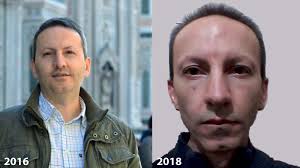RFL/RE – As a court verdict looms in Sweden in a case that has implicated high-ranking members of Iran’s clerical regime in war crimes, Tehran appears to be targeting Swedish citizens in Iran as payback.
Iran has expressed outrage over the ongoing trial of Hamid Nouri, an alleged former deputy prosecutor and member of the Islamic Revolutionary Guards Corps (IRGC) who is seen as henchman during the bloody purge of political prisoners and regime opponents at the end of the 1980-88 Iran-Iraq War.
Tehran has heightened tensions with Sweden by announcing the pending execution of Swedish-Iranian researcher Ahmadreza Jalali.
The same day that arguments concluded in Nouri’s trial, Iran announced on May 4 that Jalali would be put to death within two weeks. Just days later, the Swedish Foreign Ministry announced the arrest of a Swedish tourist who was traveling in Iran.
The pending execution of the 50-year-old Jalali has been condemned by Sweden. It has also led to accusations that Iran is holding an innocent civilian hostage to influence the outcome of Nouri’s trial and prompted a fellow inmate to launch a hunger strike in his defense.
“This is a dirty game through which they [the Iranian authorities] are torturing Ahmadreza and his family,” Jalali’s wife, Vida Mehran Nia, told RFE/RL’s Radio Farda on May 6, describing her husband as a “hostage” of the situation.
“It is such a shame to see that the Iranian government has made a pawn out of its own citizen in this political game,” she added.
While Iran has claimed that its actions against Jalali have nothing to do with Nouri’s case, the timing and rhetoric from officials indicates an act of retribution.
Jalali, who was arrested in April 2016 while visiting Iran for an academic conference, has said he is innocent of the charges of espionage and “corruption on earth” that led to his death sentence in 2017. His verdict, according to Amnesty International, stated that Jalali worked with the Israeli government, which allegedly helped him obtain a Swedish residency permit. Iran does not recognize dual citizenships of Iranian nationals.
The decision to carry out Jalali’s death sentence came as prosecutors argued in the Stockholm District Court that Nouri should be sentenced to life in prison for war crimes. The court is set to issue its verdict on July 14.

On May 1, the Iranian Foreign Ministry summoned the Swedish ambassador to lodge an “extreme protest” over Nouri’s trial, which Tehran has described as “completely illegal” and a “political show.” The Foreign Ministry decried the prosecution’s indictments of Nouri during the trial in the Swedish court and accused it of leveling false accusations against Iran.
Nouri has denied the charges that he is responsible for international war crimes due to the murder of more than 100 people while allegedly working as a deputy to a prison prosecutor carrying out orders by former Supreme Leader Ayatollah Ruhollah Khomeini to eliminate prisoners found guilty of “mohareb,” or waging war against God.
Nouri, who was arrested in Sweden in 2019 after arriving for a vacation, has been on trial since August.
‘Disturbing Reports’
In a May 4 tweet, Swedish Foreign Minister Ann Linde called reports that Iran would enforce Jalali’s death sentence “extremely worrying” and demanded his release.
A follow-up tweet said that she had spoken to Iran’s foreign minister about the “disturbing reports.”
Just days after Sweden advised its citizens to avoid traveling to Iran, citing a deteriorating security situation, it announced that it had learned that an unidentified 30-year-old Swedish male had been arrested in Iran. Sweden’s Foreign Ministry said it had launched an investigation.
The Swedish newspaper Aftonbladet quoted an informed Swedish source as saying that the development was a “warning” about the possible abduction of Swedes in retaliation for Nouri’s trial.
Mahmud Amiri Moghadam of the Norway-based Iran Human Rights Organization told Radio Farda on May 9 that Jalali’s sentencing was clear evidence that “the Islamic republic is using Jalali as a hostage” to exert pressure on Sweden over the outcome of the Nouri trial.
“We demand the international community and specifically European countries to clarify the ramifications of such an execution,” he said, describing the “hostage-taking” of Jalali as an international crime that could be punished by cutting off diplomatic and economic ties with Iran and bringing charges against those who ordered it.
Farhad Meisami, a civil rights activist who is serving a six-year prison sentence in Iran for protesting the murders of political activists there in the late 1990s,is putting his own life on the line to save Jalali’s.

Meisami announced on May 6 that he was launching a hunger strike to protest the injustice of Jalali’s death sentence.
“I met Dr. Jalali for the first time more than three years ago in the library of ward No. 4 of Evin Prison,”Meisami wrote in a message posted by supporters on Telegram, adding that Jalali’s own hunger strikes in protest at his death sentence had left him “very frail and thin.”
Recalling his experiences of seeing another inmate suffer before his death sentence was carried out, Meisami asked: “Is there any torture worse than this?”
Meisami’s lawyer, Mohammad Moghimi, told Radio Farda on May 10 that his client had concluded through his meetings with Jalali that the researcher was innocent and felt a responsibility to help save him.
“I hope the authorities, for once, let go of their foolishness,” Moghimi said, “and halt this very unfair verdict against Ahmadreza Jalali.”
 Shabtabnews In this dark night, I have lost my way – Arise from a corner, oh you the star of guidance.
Shabtabnews In this dark night, I have lost my way – Arise from a corner, oh you the star of guidance.



